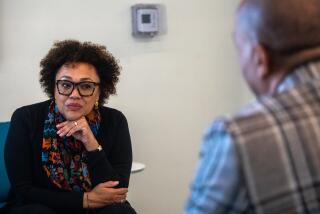Forum Focuses on Violence Among Blacks : Crime: Rainbow Coalition’s conference urges African Americans to take action on the issue. Number of solutions are proposed.
- Share via
WASHINGTON — The thin young woman, her voice shaking with emotion, arose Friday near the end of a forum on violence in the black community.
Previous speakers had put the blame on many things--childhood neglect, entrenched racism, poor education and leadership failure--for the explosive fratricide in African American neighborhoods.
“I’ve heard it all before,” sobbed Tyrene Wilson, a 20-year-old resident of a crime-ridden Washington neighborhood. “I’m scared to go out of my door. My brother was shot in the head--I don’t know for what. I don’t think I’ll see the year 2000. I need help and I am afraid.”
Her poignant plea clearly moved the conference of national leaders of black organizations and community activists, who had spent most of the day hearing a much more academic discourse on problems of violence in the black community. The gathering was convened by the Rev. Jesse Jackson’s Rainbow Coalition to consider what can be done about violence within the black community in America.
Jackson’s organization, joined by the Congressional Black Caucus and other groups usually more concerned with legislation than homicide, has focused on violence because of its profound impact on African Americans. The meeting here was part of a national campaign to induce black people to take action on the issue in their community.
“What once was a crisis, a problem, has turned into a condition,” Jackson said. “Nearly half of all murder victims are black. More blacks kill each other each year than were killed in the entire history of lynchings.”
The causes and proposed solutions offered by participants in Friday’s conference widely varied. New Orleans Mayor Sidney Barthelemy said that his city’s spending for prosecution and prisons has shot up in recent years from $3 million to $30 million annually, forcing cuts in social services.
“We all know the solutions--early childhood education works,” Barthelemy said. “An extra $3 billion a year will get every eligible child in Head Start.”
But Rahin Jenkins, representing a Muslim organization that works with prisoners, said the nation is confronted with a generation of angry black men.
“It’s racism--pure and simple,” Jenkins said. “All this crime isn’t black-on-black crime. Somebody is providing our kids with these weapons.”
Psychiatrist Frances Welsing was cheered by some in the audience when she said: “People taking us off the course of talking about racism are doing the worst violence of all. . . . We must talk about the cause of the problem or otherwise we’ll participate in digging our grave.”
Frank McNeil, an alderman from Springfield, Ill., was more pragmatic. Jobs must be provided for men coming out of prison if they are to support themselves and their families, he said, adding: “McDonald’s won’t even hire ex-offenders right now--that’s the reality.”
And Efia Nwangaza, an attorney from Greenville, S.C., rejected Jackson’s viewpoint that there are too many guns in the black community.
“To suggest that we should lay down our arms, that we should unilaterally disarm, is suicidal,” she said. “It’s the measure of our insanity that we’ll go along with the Brady bill (which imposes a five-day waiting period for handgun purchases) or any bill that interferes with our right to defend ourselves.”
Jackson, who once fought segregation in the South and became a disciple of Dr. Martin Luther King Jr., said he sees the issue as taking back the moral high ground.
“The victims must rise up and demand a change,” he said in a luncheon speech. “We must change our own ways first. . . . In cities across the country, we want to rouse a movement to demilitarize our streets . . . “
Jackson renewed his call for the federal government to spend less on military programs and more on social welfare programs for distressed urban areas. But the thrust of his message, which has become controversial in the black community, was self-improvement. He asked 100 churches in 100 cities to rescue 10 troubled black youngsters from lives of crime, averting prison and moving to self-reliance for 100,000 youth a year.
One new program in the anti-violence campaign was outlined by Rep. Maxine Waters (D-Los Angeles), who said that record companies have contributed $17 million for a yearlong effort to help 5,000 young black men from some of Los Angeles’ worst neighborhoods achieve self-reliance through a combination of counseling, education and training.
She said that those from 17 to 30 years old would be targeted by the Black Women’s Forum of Los Angeles for the “LA 17-30” program to encourage them to turn away from crime and dependency.
“They will include the Crips and the Bloods, the Eight Treys and the Five Deuces,” she said at a Friday afternoon forum, referring to some of Los Angeles’ largest gangs. The participants, who will be enrolled in vocational education, job training programs or community colleges, will receive $50-a-week stipends to pay for transportation and other expenses. Case managers, working closely with those enrolled in the program, will be responsible for helping them join mainstream society.
More to Read
Sign up for Essential California
The most important California stories and recommendations in your inbox every morning.
You may occasionally receive promotional content from the Los Angeles Times.













